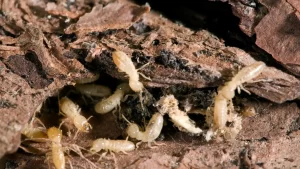In Northwest Arkansas, ants are one of the most common household pests, especially in growing suburban areas like Centerton, Bentonville, and Cave Springs. Whether you’re a long-time resident or a new homeowner in one of these vibrant communities, chances are you’ve dealt with (or will deal with) an ant invasion at some point.
Ant infestations can be more than just a nuisance. Some species contaminate food, damage structures, or even bite. Fortunately, understanding which ants are most common in this region and how to prevent them can help you avoid costly and frustrating problems.
Common Ant Species in Northwest Arkansas Homes
1. Odorous House Ants
Appearance
Small, brown or black
Where They’re Found
Kitchens, bathrooms, and inside walls
Behavior
These ants are named for the rotten coconut smell they release when crushed. They’re persistent foragers and often form long trails to and from food sources.
Why They’re a Problem
Odorous house ants can enter homes in large numbers and are notoriously difficult to eliminate without targeting the nest.
2. Pavement Ants
Appearance
Dark brown to black, about 1/8 inch long
Where They’re Found
Driveways, patios, basement floors, and foundation cracks
Behavior
These ants nest in and under concrete slabs, sidewalks, and driveways. Indoors, they often emerge from baseboards or foundation gaps.
Why They’re a Problem
Pavement ants enter homes searching for sweets and greasy foods, and they can set up colonies in wall voids or under floors.
3. Carpenter Ants
Appearance
Large (up to 1/2 inch), black or red-black
Where They’re Found
Rooflines, decks, window frames, and attics
Behavior
Carpenter ants nest in damp or decaying wood, which makes homes with moisture issues especially vulnerable.
Why They’re a Problem
Unlike termites, carpenter ants don’t eat wood, but they tunnel through it to build nests, potentially compromising structural integrity.
4. Field Ants
Appearance
Varies in color; larger than most common house ants
Where They’re Found
Lawns, mulch beds, and around foundation perimeters
Behavior
These ants build large mounds outdoors but may enter homes when their colony is disturbed or after heavy rain.
Why They’re a Problem
While not typically indoor pests, their presence near a home can lead to occasional indoor invasions and lawn damage.
Why Ants Are a Growing Issue in Centerton, Bentonville, and Cave Springs
The rapid residential expansion in these communities has disturbed many native ant habitats. As wooded lots are cleared and new homes are built, ants often relocate to more stable environments such as inside your house.
Additional regional factors include:
- Clay-heavy soil that promotes ant tunneling and moisture retention
- Long, humid summers that accelerate ant breeding cycles
- Frequent rainstorms that drive ants indoors seeking dry shelter
Prevention Tips for Homeowners
You can prevent most ant problems with consistent maintenance and by making your home less attractive to ants. Here’s how:
1. Seal Entry Points
- Use silicone caulk to close gaps around windows, doors, and utility lines
- Install door sweeps and repair weather stripping
- Inspect foundations for cracks and seal them
2. Eliminate Food Sources
- Keep counters clean and free of crumbs
- Store food in airtight containers
- Rinse recyclables and take trash out regularly
- Clean pet food bowls and avoid leaving food out overnight
3. Manage Moisture
- Fix leaking pipes, faucets, and AC condensation lines
- Use dehumidifiers in basements and crawlspaces
- Redirect downspouts away from the foundation
4. Trim Vegetation
- Keep shrubs, trees, and mulch beds away from the sides of your home
- Avoid stacking firewood against your house
- Maintain a clear perimeter to reduce nesting opportunities
5. Monitor Outdoor Activity
- Watch for visible ant trails or mounds in the yard
- Inspect decks, porches, and fences for carpenter ant activity
- Treat entry points with ant-repellent products during warmer months
When to Call a Professional
While DIY efforts can reduce minor infestations, persistent ant problems often require professional pest control. This is especially true with carpenter ants or when ants return repeatedly despite cleaning and sealing.
A licensed pest control provider can:
- Identify the specific species and nesting sites
- Apply targeted treatments to eliminate colonies
- Offer ongoing maintenance plans to prevent future infestations
Final Thoughts
Ants are a part of life in Centerton, Bentonville, and Cave Springs, but they don’t have to be part of your home. With regular maintenance, quick action, and a proactive mindset, you can keep your living space ant-free all year long.
Dealing with ants now or want a preventative inspection? Contact Rid-a-Pest for local, reliable service tailored to the unique conditions of Northwest Arkansas.



